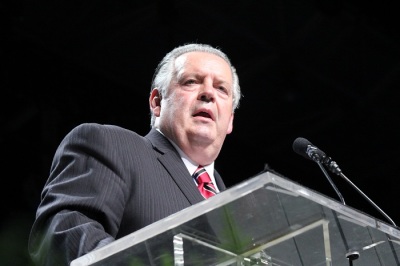A president's legacy

One of the most important things a president of the United States does is nominate people to be confirmed by the United States Senate to serve life-time appointments on the U.S. Supreme Court. Given the extremely critical role the Supreme Court has played in American society in the last half of the twentieth and the first fifth of the twenty-first century, a president’s legacy and influence go on through his Supreme Court nominations long after he leaves office and even this earthly life.
Of course, in order to nominate Court Justices, a vacancy has to occur. Some presidents have far more opportunity than others. For instance, President Carter had zero opportunities to fill a Supreme Court vacancy through his one term in office. Since the end of World War II, President Eisenhower had the most opportunities, with five Supreme Court vacancies. Presidents Kennedy, Johnson, Bush (41), Clinton, Bush (43), and Obama were each able to nominate two Supreme Court Justices, and President Reagan nominated three.
So, assuming that former vice-president Biden is sworn in on January 20th, 2021, President Trump will have had the extraordinary opportunity to place three of his nominees on the Supreme Court over one four-year term.
And from their early judicial record on the court, President Trump’s nominees will leave a huge Trump legacy on America. A “supreme” example of this influence is the Supreme Court’s decision on Thanksgiving eve, which reaffirmed the glorious freedoms guaranteed to Americans in the Constitution’s First Amendment.
In Roman Catholic Diocese of Brooklyn, New York, v. Andrew M. Cuomo, the Supreme Court struck down Governor Cuomo’s draconian restrictions on religious services, which particularly targeted Orthodox Jews and Roman Catholics.
With a five to four vote, with President Trump’s three nominees, Gorsuch, Kavanaugh, and Barrett, voting with the majority (they made the majority) declared, “Members of this court are not public health experts, and we should respect the judgment of those with special expertise and responsibility in this area. But even in a pandemic, the Constitution cannot be put away and forgotten. Restrictions at issue here, by effectively barring many from religious services, strike at the very heart of the First Amendment’s guarantees of religious liberty.”
Justice Gorsuch, who is showing a real talent for a memorable turn of phrase, stated in his concurring opinion, “Government is not free to disregard the First Amendment in times of crisis. At a minimum, that Amendment prohibits government officials from treating religious exercises worse than comparable secular activities.” Justice Kavanaugh added, “The judicial deference in an emergency or crisis does not mean wholesale judicial advocation, especially when important questions of religious discrimination, racial discrimination, free speech, or the like are raised.” Justice Gorsuch opined that, “In far too many places, far too long, our first freedom has fallen on deaf ears.” Gorsuch observed, “we may not shelter in place when the Constitution is under attack,” and then added, “even if the Constitution has taken a holiday during pandemic, it cannot become a sabbatical.”
And then the icing on the cake, Gorsuch concludes, “It is time – past time – to make plain, that while the pandemic poses many great challenges, there is no world in which the Constitution tolerates color-coded executive edicts that reopen liquor stores and bike shops but shutter churches, synagogues, and mosques.”
This decision in the Brooklyn case has already begun to reverberate around the country. Just yesterday the Supreme Court remanded to the lower courts for reconsideration California Governor Newsom’s similarly draconian restrictions on religious services. The decision will have a well-deserved, chilling effect on governors across the land who have been tempted to ignore the First Amendment’s religious freedom clauses.
When it comes to Supreme Court nominees, President Trump is batting three for three, which gives him a perfect nominating average when compared to his most immediate Republican predecessor George W. Bush, who has a five hundred nominating average since Chief Justice Roberts seems to have retired from the strict constructionist, original intent field and has become increasingly obsessed with process rather than original principle.
President Trump’s troika of nominees shows no hint of such a future drift. They seem to be made of sterner stuff than the Chief Justice. If that proves to be the case, President Trump’s original intent, strict constructionist nominees will be having a positive influence on religious liberty and freedom in America long after President Trump has departed this world. And I certainly hope and pray that that is the case.
Dr. Richard Land, BA (magna cum laude), Princeton; D.Phil. Oxford; and Th.M., New Orleans Baptist Theological Seminary, was president of the Southern Baptists’ Ethics & Religious Liberty Commission (1988-2013) and has served since 2013 as president of Southern Evangelical Seminary in Charlotte, NC. Dr. Land has been teaching, writing, and speaking on moral and ethical issues for the last half century in addition to pastoring several churches. He is the author of The Divided States of America, Imagine! A God Blessed America, Real Homeland Security, For Faith & Family and Send a Message to Mickey.





















